stop start FIAT FIORINO 2009 Owner handbook (in English)
[x] Cancel search | Manufacturer: FIAT, Model Year: 2009, Model line: FIORINO, Model: FIAT FIORINO 2009Pages: 210, PDF Size: 3.56 MB
Page 70 of 210
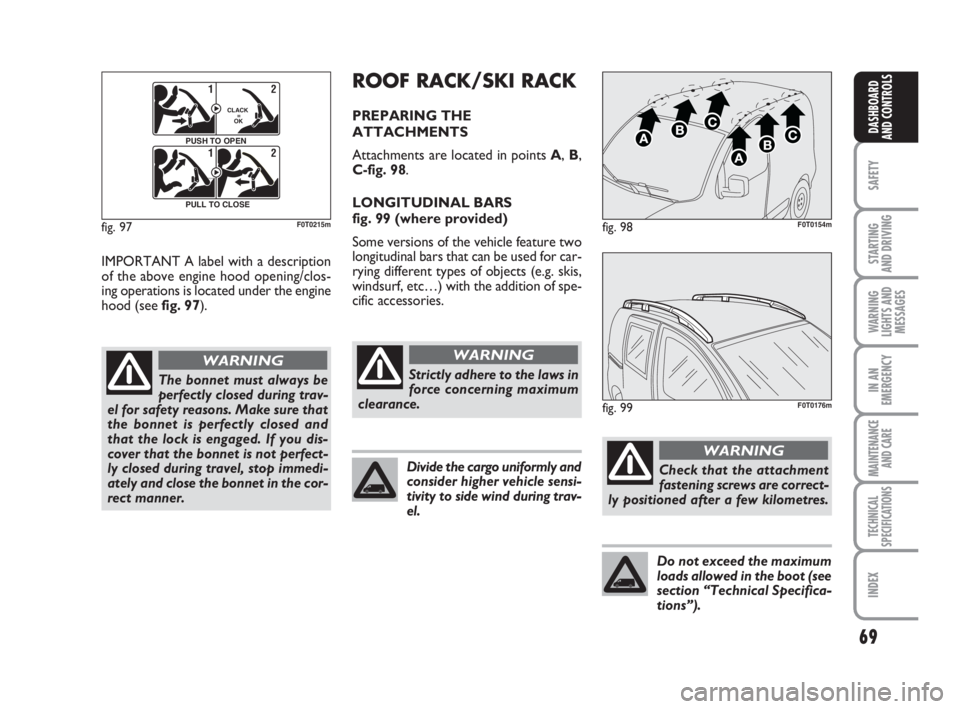
69
SAFETY
STARTING
AND DRIVING
WARNING
LIGHTS AND
MESSAGES
IN AN
EMERGENCY
MAINTENANCE
AND CARE
TECHNICAL
SPECIFICATIONS
INDEX
DASHBOARD
AND CONTROLS
IMPORTANT A label with a description
of the above engine hood opening/clos-
ing operations is located under the engine
hood (see fig. 97).
The bonnet must always be
perfectly closed during trav-
el for safety reasons. Make sure that
the bonnet is perfectly closed and
that the lock is engaged. If you dis-
cover that the bonnet is not perfect-
ly closed during travel, stop immedi-
ately and close the bonnet in the cor-
rect manner.
WARNING
fig. 97
F0Q0603m
12
CLACK
=
OK
PUSH TO OPEN12
PULL TO CLOSE
F0T0215mfig. 98F0T0154m
fig. 99F0T0176m
Strictly adhere to the laws in
force concerning maximum
clearance.
WARNING
Check that the attachment
fastening screws are correct-
ly positioned after a few kilometres.
WARNING
Divide the cargo uniformly and
consider higher vehicle sensi-
tivity to side wind during trav-
el.
Do not exceed the maximum
loads allowed in the boot (see
section “Technical Specifica-
tions”).
ROOF RACK/SKI RACK
PREPARING THE
ATTACHMENTS
Attachments are located in points A,B,
C-fig. 98.
LONGITUDINAL BARS
fig. 99 (where provided)
Some versions of the vehicle feature two
longitudinal bars that can be used for car-
rying different types of objects (e.g. skis,
windsurf, etc…) with the addition of spe-
cific accessories.
036-082 CombiCargo GB 1ed 21-10-2008 14:17 Pagina 69
Page 72 of 210
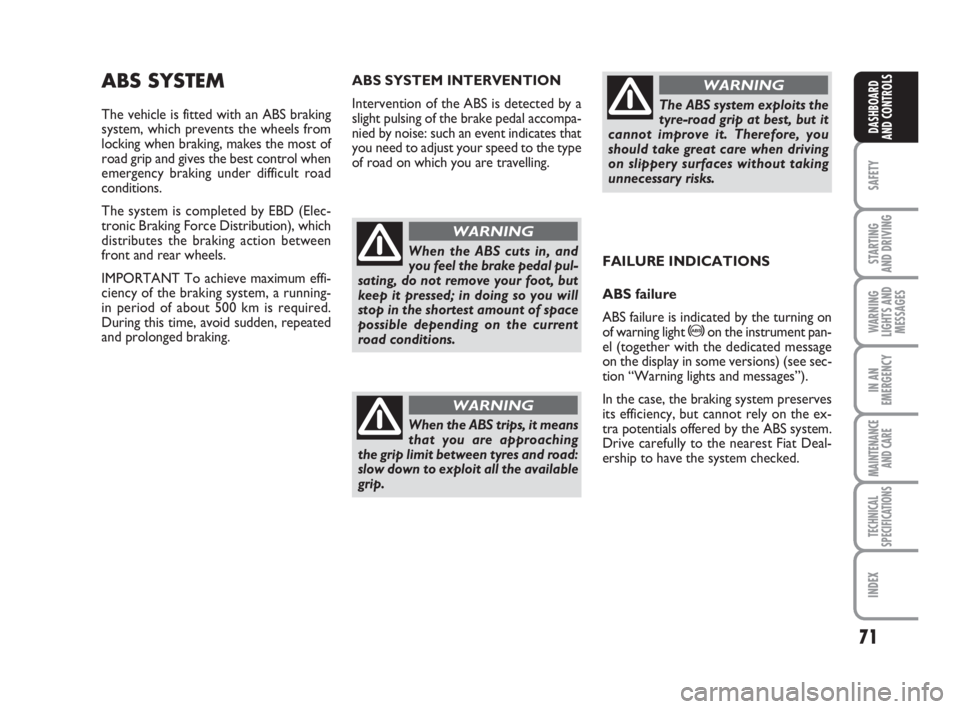
71
SAFETY
STARTING
AND DRIVING
WARNING
LIGHTS AND
MESSAGES
IN AN
EMERGENCY
MAINTENANCE
AND CARE
TECHNICAL
SPECIFICATIONS
INDEX
DASHBOARD
AND CONTROLS
ABS SYSTEM
The vehicle is fitted with an ABS braking
system, which prevents the wheels from
locking when braking, makes the most of
road grip and gives the best control when
emergency braking under difficult road
conditions.
The system is completed by EBD (Elec-
tronic Braking Force Distribution), which
distributes the braking action between
front and rear wheels.
IMPORTANT To achieve maximum effi-
ciency of the braking system, a running-
in period of about 500 km is required.
During this time, avoid sudden, repeated
and prolonged braking.FAILURE INDICATIONS
ABS failure
ABS failure is indicated by the turning on
of warning light
>on the instrument pan-
el (together with the dedicated message
on the display in some versions) (see sec-
tion “Warning lights and messages”).
In the case, the braking system preserves
its efficiency, but cannot rely on the ex-
tra potentials offered by the ABS system.
Drive carefully to the nearest Fiat Deal-
ership to have the system checked. ABS SYSTEM INTERVENTION
Intervention of the ABS is detected by a
slight pulsing of the brake pedal accompa-
nied by noise: such an event indicates that
you need to adjust your speed to the type
of road on which you are travelling.
When the ABS cuts in, and
you feel the brake pedal pul-
sating, do not remove your foot, but
keep it pressed; in doing so you will
stop in the shortest amount of space
possible depending on the current
road conditions.
WARNING
When the ABS trips, it means
that you are approaching
the grip limit between tyres and road:
slow down to exploit all the available
grip.
WARNING
The ABS system exploits the
tyre-road grip at best, but it
cannot improve it. Therefore, you
should take great care when driving
on slippery surfaces without taking
unnecessary risks.
WARNING
036-082 CombiCargo GB 1ed 21-10-2008 14:17 Pagina 71
Page 73 of 210
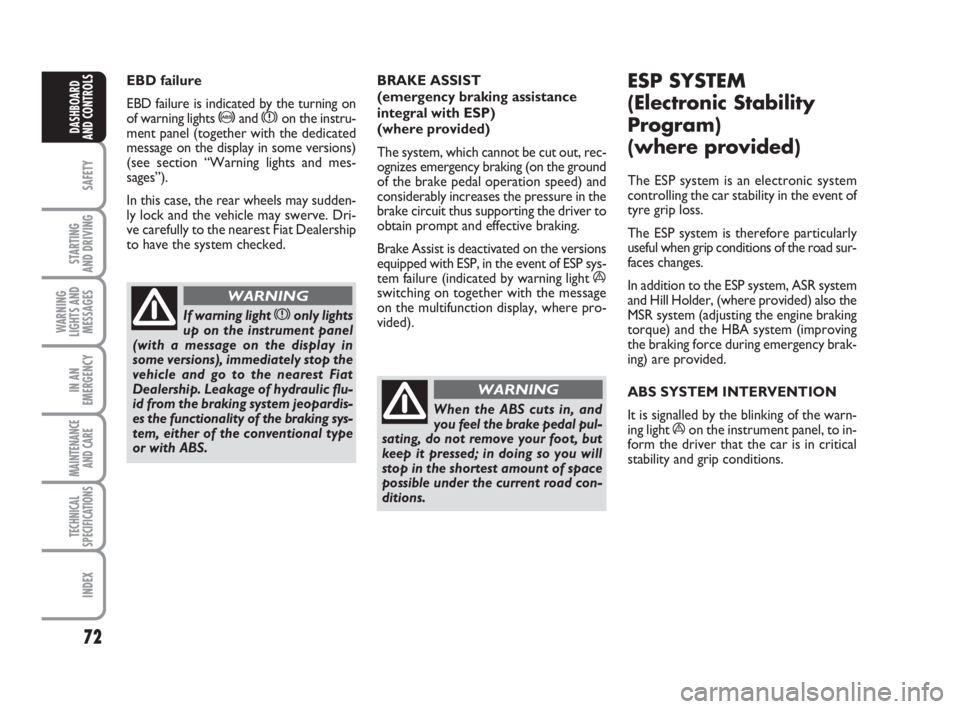
72
SAFETY
STARTING
AND DRIVING
WARNING
LIGHTS AND
MESSAGES
IN AN
EMERGENCY
MAINTENANCE
AND CARE
TECHNICAL
SPECIFICATIONS
INDEX
DASHBOARD
AND CONTROLS
If warning light xonly lights
up on the instrument panel
(with a message on the display in
some versions), immediately stop the
vehicle and go to the nearest Fiat
Dealership. Leakage of hydraulic flu-
id from the braking system jeopardis-
es the functionality of the braking sys-
tem, either of the conventional type
or with ABS.
WARNING
EBD failure
EBD failure is indicated by the turning on
of warning lights
>and xon the instru-
ment panel (together with the dedicated
message on the display in some versions)
(see section “Warning lights and mes-
sages”).
In this case, the rear wheels may sudden-
ly lock and the vehicle may swerve. Dri-
ve carefully to the nearest Fiat Dealership
to have the system checked.BRAKE ASSIST
(emergency braking assistance
integral with ESP)
(where provided)
The system, which cannot be cut out, rec-
ognizes emergency braking (on the ground
of the brake pedal operation speed) and
considerably increases the pressure in the
brake circuit thus supporting the driver to
obtain prompt and effective braking.
Brake Assist is deactivated on the versions
equipped with ESP, in the event of ESP sys-
tem failure (indicated by warning light
áswitching on together with the message
on the multifunction display, where pro-
vided).
ESP SYSTEM
(Electronic Stability
Program)
(where provided)
The ESP system is an electronic system
controlling the car stability in the event of
tyre grip loss.
The ESP system is therefore particularly
useful when grip conditions of the road sur-
faces changes.
In addition to the ESP system, ASR system
and Hill Holder, (where provided) also the
MSR system (adjusting the engine braking
torque) and the HBA system (improving
the braking force during emergency brak-
ing) are provided.
ABS SYSTEM INTERVENTION
It is signalled by the blinking of the warn-
ing light
áon the instrument panel, to in-
form the driver that the car is in critical
stability and grip conditions.
When the ABS cuts in, and
you feel the brake pedal pul-
sating, do not remove your foot, but
keep it pressed; in doing so you will
stop in the shortest amount of space
possible under the current road con-
ditions.
WARNING
036-082 CombiCargo GB 1ed 21-10-2008 14:17 Pagina 72
Page 78 of 210
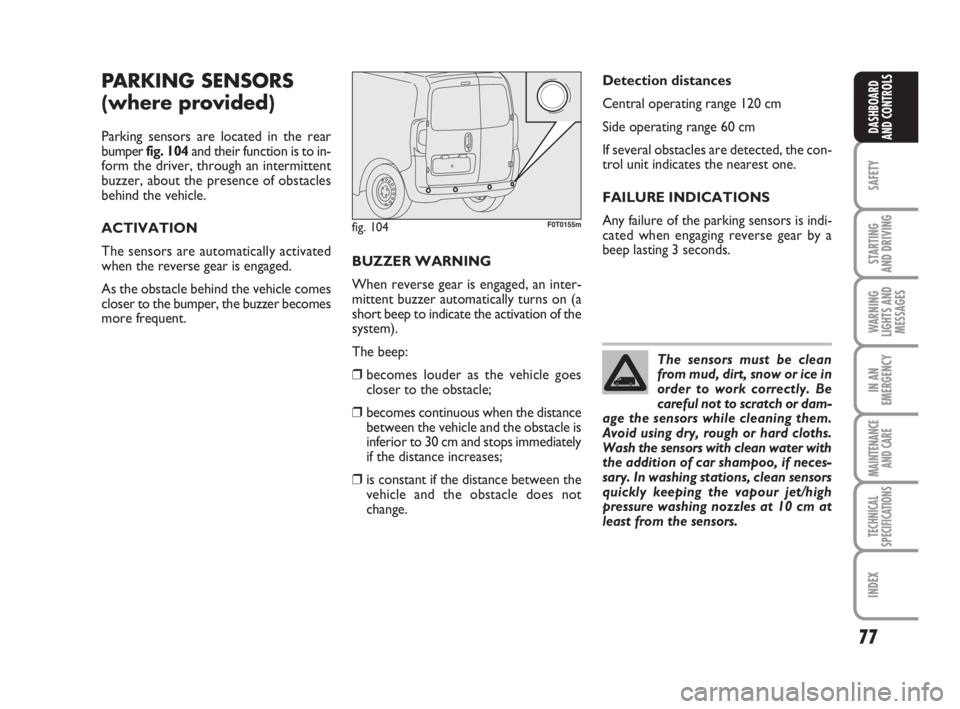
77
SAFETY
STARTING
AND DRIVING
WARNING
LIGHTS AND
MESSAGES
IN AN
EMERGENCY
MAINTENANCE
AND CARE
TECHNICAL
SPECIFICATIONS
INDEX
DASHBOARD
AND CONTROLS
PARKING SENSORS
(where provided)
Parking sensors are located in the rear
bumper fig. 104and their function is to in-
form the driver, through an intermittent
buzzer, about the presence of obstacles
behind the vehicle.
ACTIVATION
The sensors are automatically activated
when the reverse gear is engaged.
As the obstacle behind the vehicle comes
closer to the bumper, the buzzer becomes
more frequent.BUZZER WARNING
When reverse gear is engaged, an inter-
mittent buzzer automatically turns on (a
short beep to indicate the activation of the
system).
The beep:
❒becomes louder as the vehicle goes
closer to the obstacle;
❒becomes continuous when the distance
between the vehicle and the obstacle is
inferior to 30 cm and stops immediately
if the distance increases;
❒is constant if the distance between the
vehicle and the obstacle does not
change.Detection distances
Central operating range 120 cm
Side operating range 60 cm
If several obstacles are detected, the con-
trol unit indicates the nearest one.
FAILURE INDICATIONS
Any failure of the parking sensors is indi-
cated when engaging reverse gear by a
beep lasting 3 seconds.
fig. 104F0T0155m
The sensors must be clean
from mud, dirt, snow or ice in
order to work correctly. Be
careful not to scratch or dam-
age the sensors while cleaning them.
Avoid using dry, rough or hard cloths.
Wash the sensors with clean water with
the addition of car shampoo, if neces-
sary. In washing stations, clean sensors
quickly keeping the vapour jet/high
pressure washing nozzles at 10 cm at
least from the sensors.
036-082 CombiCargo GB 1ed 21-10-2008 14:17 Pagina 77
Page 101 of 210
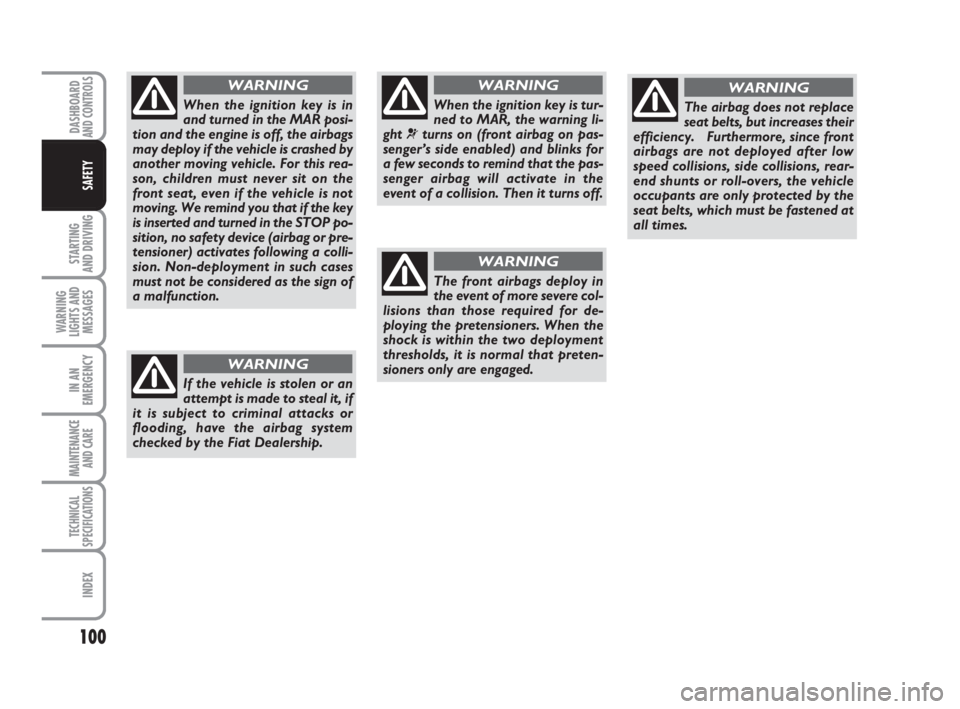
100
STARTING
AND DRIVING
WARNING
LIGHTS AND
MESSAGES
IN AN
EMERGENCY
MAINTENANCE
AND CARE
TECHNICAL
SPECIFICATIONS
INDEX
DASHBOARDAND CONTROLS
SAFETY
When the ignition key is tur-
ned to MAR, the warning li-
ght
¬turns on (front airbag on pas-
senger’s side enabled) and blinks for
a few seconds to remind that the pas-
senger airbag will activate in the
event of a collision. Then it turns off.
WARNING
The front airbags deploy in
the event of more severe col-
lisions than those required for de-
ploying the pretensioners. When the
shock is within the two deployment
thresholds, it is normal that preten-
sioners only are engaged.
WARNING
The airbag does not replace
seat belts, but increases their
efficiency. Furthermore, since front
airbags are not deployed after low
speed collisions, side collisions, rear-
end shunts or roll-overs, the vehicle
occupants are only protected by the
seat belts, which must be fastened at
all times.
WARNING
When the ignition key is in
and turned in the MAR posi-
tion and the engine is off, the airbags
may deploy if the vehicle is crashed by
another moving vehicle. For this rea-
son, children must never sit on the
front seat, even if the vehicle is not
moving. We remind you that if the key
is inserted and turned in the STOP po-
sition, no safety device (airbag or pre-
tensioner) activates following a colli-
sion. Non-deployment in such cases
must not be considered as the sign of
a malfunction.
WARNING
If the vehicle is stolen or an
attempt is made to steal it, if
it is subject to criminal attacks or
flooding, have the airbag system
checked by the Fiat Dealership.
WARNING
083-100 CombiCargo GB 1ed 21-10-2008 14:12 Pagina 100
Page 103 of 210
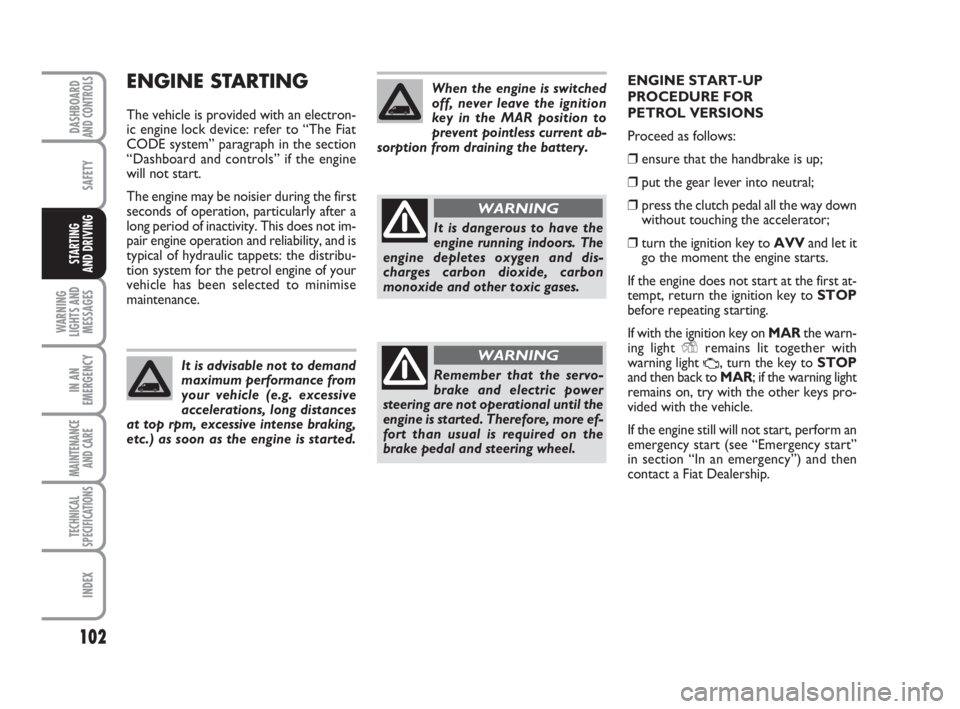
102
SAFETY
WARNING
LIGHTS AND
MESSAGES
IN AN
EMERGENCY
MAINTENANCE
AND CARE
TECHNICAL
SPECIFICATIONS
INDEX
DASHBOARDAND CONTROLS
STARTING
AND DRIVING
ENGINE STARTING
The vehicle is provided with an electron-
ic engine lock device: refer to “The Fiat
CODE system” paragraph in the section
“Dashboard and controls” if the engine
will not start.
The engine may be noisier during the first
seconds of operation, particularly after a
long period of inactivity. This does not im-
pair engine operation and reliability, and is
typical of hydraulic tappets: the distribu-
tion system for the petrol engine of your
vehicle has been selected to minimise
maintenance.ENGINE START-UP
PROCEDURE FOR
PETROL VERSIONS
Proceed as follows:
❒ensure that the handbrake is up;
❒put the gear lever into neutral;
❒press the clutch pedal all the way down
without touching the accelerator;
❒turn the ignition key to AVVand let it
go the moment the engine starts.
If the engine does not start at the first at-
tempt, return the ignition key to STOP
before repeating starting.
If with the ignition key on MARthe warn-
ing light Yremains lit together with
warning light
U, turn the key to STOP
and then back to MAR; if the warning light
remains on, try with the other keys pro-
vided with the vehicle.
If the engine still will not start, perform an
emergency start (see “Emergency start”
in section “In an emergency”) and then
contact a Fiat Dealership. It is advisable not to demand
maximum performance from
your vehicle (e.g. excessive
accelerations, long distances
at top rpm, excessive intense braking,
etc.) as soon as the engine is started.
When the engine is switched
off, never leave the ignition
key in the MAR position to
prevent pointless current ab-
sorption from draining the battery.
Remember that the servo-
brake and electric power
steering are not operational until the
engine is started. Therefore, more ef-
fort than usual is required on the
brake pedal and steering wheel.
WARNING
It is dangerous to have the
engine running indoors. The
engine depletes oxygen and dis-
charges carbon dioxide, carbon
monoxide and other toxic gases.
WARNING
101-110 CombiCargo GB 1ed 21-10-2008 14:13 Pagina 102
Page 104 of 210
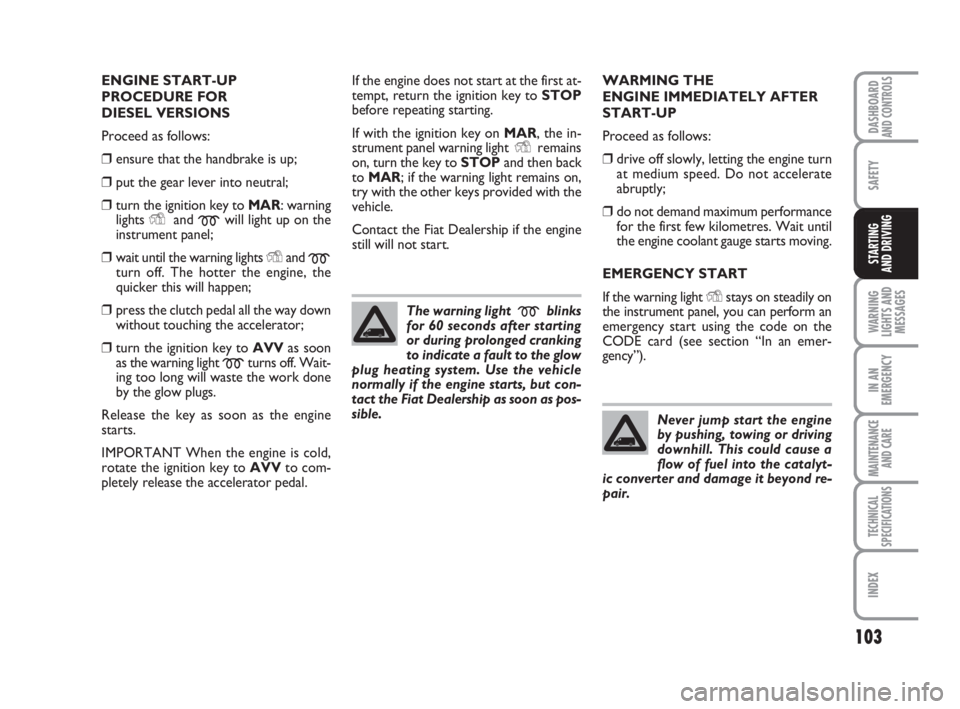
103
SAFETY
WARNING
LIGHTS AND
MESSAGES
IN AN
EMERGENCY
MAINTENANCE
AND CARE
TECHNICAL
SPECIFICATIONS
INDEX
DASHBOARDAND CONTROLS
STARTING
AND DRIVING
ENGINE START-UP
PROCEDURE FOR
DIESEL VERSIONS
Proceed as follows:
❒ensure that the handbrake is up;
❒put the gear lever into neutral;
❒turn the ignition key to MAR: warning
lights Yand
mwill light up on the
instrument panel;
❒wait until the warning lights Yand
mturn off. The hotter the engine, the
quicker this will happen;
❒press the clutch pedal all the way down
without touching the accelerator;
❒turn the ignition key to AVVas soon
as the warning light
mturns off. Wait-
ing too long will waste the work done
by the glow plugs.
Release the key as soon as the engine
starts.
IMPORTANT When the engine is cold,
rotate the ignition key to AVVto com-
pletely release the accelerator pedal.If the engine does not start at the first at-
tempt, return the ignition key to STOP
before repeating starting.
If with the ignition key on MAR, the in-
strument panel warning light Yremains
on, turn the key to STOPand then back
to MAR; if the warning light remains on,
try with the other keys provided with the
vehicle.
Contact the Fiat Dealership if the engine
still will not start.
The warning light
mblinks
for 60 seconds after starting
or during prolonged cranking
to indicate a fault to the glow
plug heating system. Use the vehicle
normally if the engine starts, but con-
tact the Fiat Dealership as soon as pos-
sible.
WARMING THE
ENGINE IMMEDIATELY AFTER
START-UP
Proceed as follows:
❒drive off slowly, letting the engine turn
at medium speed. Do not accelerate
abruptly;
❒do not demand maximum performance
for the first few kilometres. Wait until
the engine coolant gauge starts moving.
EMERGENCY START
If the warning light Ystays on steadily on
the instrument panel, you can perform an
emergency start using the code on the
CODE card (see section “In an emer-
gency”).
Never jump start the engine
by pushing, towing or driving
downhill. This could cause a
flow of fuel into the catalyt-
ic converter and damage it beyond re-
pair.
101-110 CombiCargo GB 1ed 21-10-2008 14:13 Pagina 103
Page 105 of 210

104
SAFETY
WARNING
LIGHTS AND
MESSAGES
IN AN
EMERGENCY
MAINTENANCE
AND CARE
TECHNICAL
SPECIFICATIONS
INDEX
DASHBOARDAND CONTROLS
STARTING
AND DRIVING
HANDBRAKE
The handbrake lever is located between
the two front seats.
Pull the lever upwards until the vehicle is
blocked to operate the handbrake.
When the handbrake lever is pulled up
and the ignition key is on MAR, the in-
strument panel warning light xwill turn
on.
Proceed as follows to release the hand-
brake:
❒slightly lift the handbrake and press the
release button A-fig. 1;
❒hold button Apressed and lower the
lever. Warning light xon the instru-
ment panel will go out.
Press the brake pedal when carrying out
this operation to prevent the vehicle from
moving accidentally.PARKING THE VEHICLE
Proceed as follows:
❒stop the engine and engage the hand-
brake;
❒engage a gear (on a slope, engage first
gear if the vehicle faces uphill or reverse
if it faces downhill) and leave the wheels
steered.
If the vehicle is parked on a steep slope,
it is advisable to further block the wheels
with a wedge or stone.
Do not leave the ignition key on MARto
prevent draining the battery. Always re-
move the key when you leave the vehi-
cle.
Never leave children unattended in the ve-
hicle. Always remove the ignition key
when leaving the vehicle and take it out
with you. STOPPING THE ENGINE
Turn the ignition to STOPwhile the en-
gine is idling.
IMPORTANTAfter a demanding dri-
ve, you should allow the engine to “catch
its breath” before turning it off by letting
it idle to allow the temperature in the en-
gine compartment to fall.
A quick burst on the acceler-
ator before turning off the en-
gine serves absolutely no
practical purpose, it wastes
fuel and is damaging especially to tur-
bocharged engines.
fig. 1F0T0043m
The vehicle must be braked
after a few snaps of the
lever, otherwise, contact the Fiat
Dealership for regulation.
WARNING
101-110 CombiCargo GB 1ed 21-10-2008 14:13 Pagina 104
Page 108 of 210
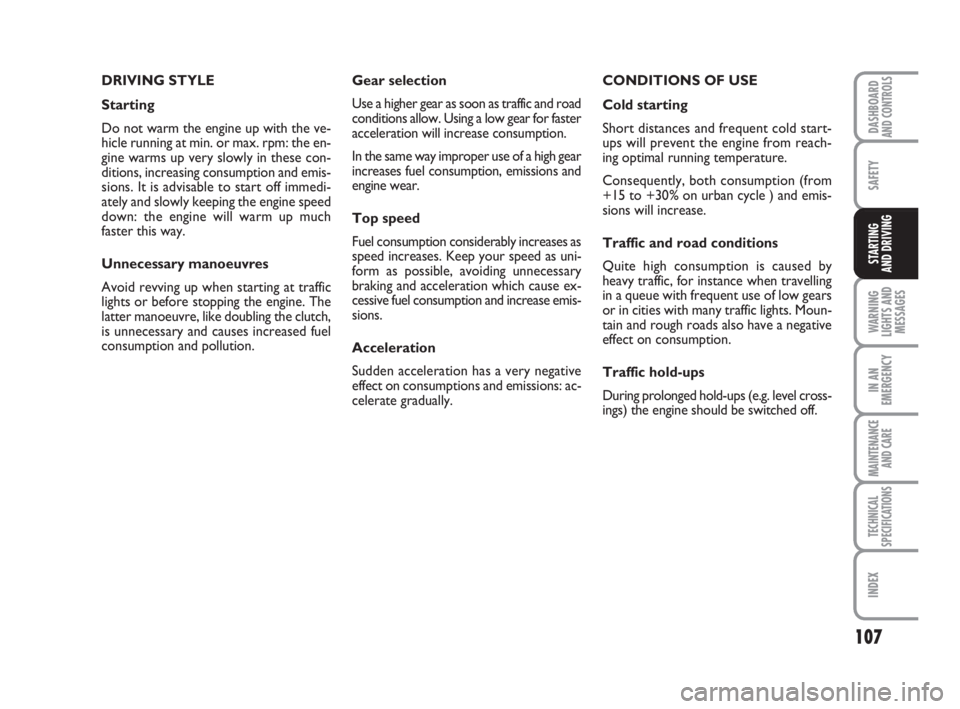
107
SAFETY
WARNING
LIGHTS AND
MESSAGES
IN AN
EMERGENCY
MAINTENANCE
AND CARE
TECHNICAL
SPECIFICATIONS
INDEX
DASHBOARDAND CONTROLS
STARTING
AND DRIVING
DRIVING STYLE
Starting
Do not warm the engine up with the ve-
hicle running at min. or max. rpm: the en-
gine warms up very slowly in these con-
ditions, increasing consumption and emis-
sions. It is advisable to start off immedi-
ately and slowly keeping the engine speed
down: the engine will warm up much
faster this way.
Unnecessary manoeuvres
Avoid revving up when starting at traffic
lights or before stopping the engine. The
latter manoeuvre, like doubling the clutch,
is unnecessary and causes increased fuel
consumption and pollution.Gear selection
Use a higher gear as soon as traffic and road
conditions allow. Using a low gear for faster
acceleration will increase consumption.
In the same way improper use of a high gear
increases fuel consumption, emissions and
engine wear.
Top speed
Fuel consumption considerably increases as
speed increases. Keep your speed as uni-
form as possible, avoiding unnecessary
braking and acceleration which cause ex-
cessive fuel consumption and increase emis-
sions.
Acceleration
Sudden acceleration has a very negative
effect on consumptions and emissions: ac-
celerate gradually.CONDITIONS OF USE
Cold starting
Short distances and frequent cold start-
ups will prevent the engine from reach-
ing optimal running temperature.
Consequently, both consumption (from
+15 to +30% on urban cycle ) and emis-
sions will increase.
Traffic and road conditions
Quite high consumption is caused by
heavy traffic, for instance when travelling
in a queue with frequent use of low gears
or in cities with many traffic lights. Moun-
tain and rough roads also have a negative
effect on consumption.
Traffic hold-ups
During prolonged hold-ups (e.g. level cross-
ings) the engine should be switched off.
101-110 CombiCargo GB 1ed 21-10-2008 14:13 Pagina 107
Page 111 of 210
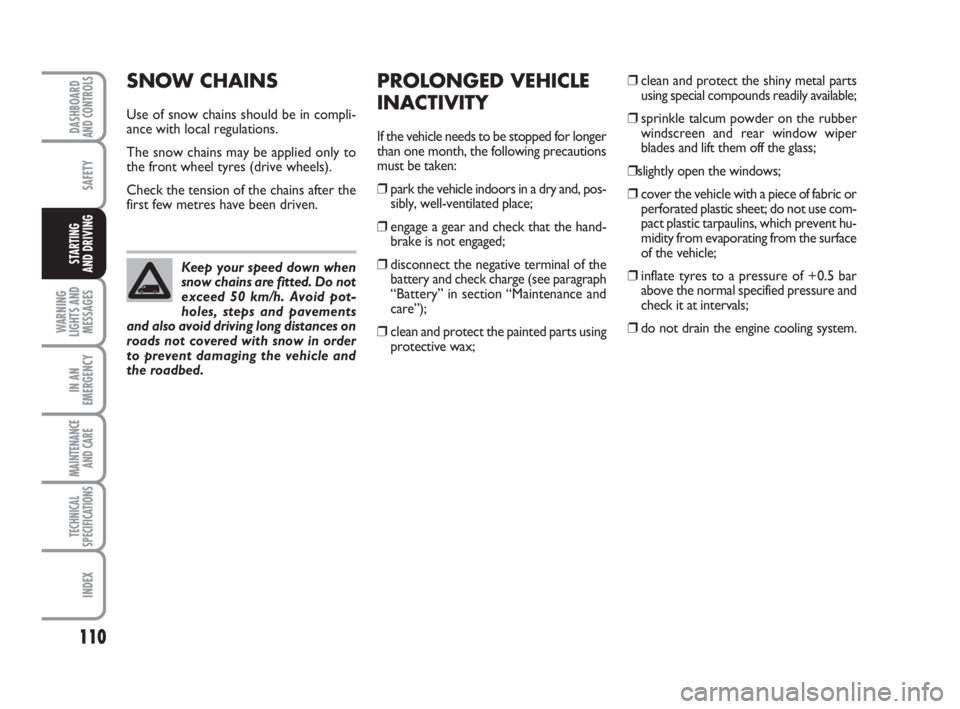
110
SAFETY
WARNING
LIGHTS AND
MESSAGES
IN AN
EMERGENCY
MAINTENANCE
AND CARE
TECHNICAL
SPECIFICATIONS
INDEX
DASHBOARDAND CONTROLS
STARTING
AND DRIVING
SNOW CHAINS
Use of snow chains should be in compli-
ance with local regulations.
The snow chains may be applied only to
the front wheel tyres (drive wheels).
Check the tension of the chains after the
first few metres have been driven.
PROLONGED VEHICLE
INACTIVITY
If the vehicle needs to be stopped for longer
than one month, the following precautions
must be taken:
❒park the vehicle indoors in a dry and, pos-
sibly, well-ventilated place;
❒engage a gear and check that the hand-
brake is not engaged;
❒disconnect the negative terminal of the
battery and check charge (see paragraph
“Battery” in section “Maintenance and
care”);
❒clean and protect the painted parts using
protective wax;❒clean and protect the shiny metal parts
using special compounds readily available;
❒sprinkle talcum powder on the rubber
windscreen and rear window wiper
blades and lift them off the glass;
❒slightly open the windows;
❒cover the vehicle with a piece of fabric or
perforated plastic sheet; do not use com-
pact plastic tarpaulins, which prevent hu-
midity from evaporating from the surface
of the vehicle;
❒inflate tyres to a pressure of +0.5 bar
above the normal specified pressure and
check it at intervals;
❒do not drain the engine cooling system. Keep your speed down when
snow chains are fitted. Do not
exceed 50 km/h. Avoid pot-
holes, steps and pavements
and also avoid driving long distances on
roads not covered with snow in order
to prevent damaging the vehicle and
the roadbed.
101-110 CombiCargo GB 1ed 21-10-2008 14:13 Pagina 110